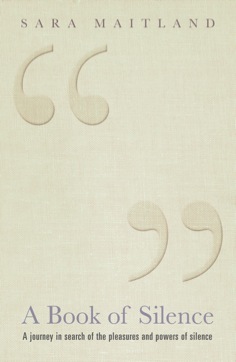
As a natural introvert, with a love of tranquillity, and a dislike for unnecessary noise, I was intrigued by the idea of a whole book on the subject of silence.
A Book of Silence is a personal and, at times, courageous book. Sara Maitland writes with almost painful honesty about her desire to explore and embrace silences. I use the plural, because, as Maitland points out, there are different forms of silence; silence is not just—and not always—the absence of sound. She writes unflinchingly about what silence means to her, even though she sometimes acknowledges struggling to put what she feels into words.
At times, particularly early on in this book, I found myself nodding in almost violent agreement, as Maitland expressed thoughts and sentiments—not all of them about silence—which were uncannily like my own, and which I have often expressed to others:
For me the terrain of silence is what I have since come to call the Huge Nothing of the high moorlands…
Moors are excellent for elementary walkers, especially those who smoke, because once you are above the valleys there are miles and miles of long views often down on to woods and rivers, but the terrain itself is flat, without steep climbs. There is always something to see but you have to look for it.
Except for the reference to smoking, these could have been my own words. As could these, describing a wonderful night sky (Maitland’s sky was in Galloway, mine in Anglesey):
There were so many stars it was impossible for me to pick out the constellations that I did know. It was not ‘flat’. I had a real sense of three-dimensionality of the sky.
Maitland then turns to a subject which I, for want of a better phrase, have clumsily described to friends as a reality rush:
The first effect that I noticed, towards the end of the first week, was an extraordinary intensification of physical sensation. It started with food. [She goes on to describe the intensification of other sensations: hearing, body temperature, and emotions…]
Whatever caused this intensification it was not some psychological peculiarity of my own. Almost every account of silence I have ever read contains some version of it. In my journal at the time [this is the point at which Maitland begins to lose me] I commented that this intensification of sensation make me think of Saint Anthony’s sexual torments.
Maitland is a devout Roman Catholic Christian. Her faith is central to her identity. She has clearly thought—and, indeed meditated at length—about her relationship with her god. She is totally sincere about what it means to her. But, as an atheist without a shred of religious belief, I frequently hadn’t a clue what she was talking about:
I started to think that perhaps silence is God. Perhaps God is silence—the shining, spinning ring ‘of pure and endless light’. Perhaps God speaking is a ‘verb’, an act, but God in perfect self-communication, in love within the Trinity, is silent and therefore is silence. God is silence, a silence that is positive, alive, actual and of its ‘nature’ unbreakable. Perhaps the verb ‘God’—speaking, creating—is one more reflex of the infinite generosity, the self-giving abandonment, the kenotic love of God. Perhaps the incarnation of the Word is but a secondary expression of that ‘for our hardness of heart’. Far from ‘all silence is waiting to be broken’ perhaps all speech is crying out ‘like a woman in travail’ to be reabsorbed into silence, into death, into the liminal space that opens out into the presence of the everlasting silence.
It’s not that I disagree with such sentiments (although, as an atheist, clearly I do); it’s that I have literally no idea what Maitland is trying to say here. It’s not that I don’t understand her words. We share no common ground. In my frame of reference, her words have no meaning.
I finished this book having warmed considerably to Sara Maitland as a fellow human being, not least for her courageous and thoughtful honesty. But her theology left me out it the cold.
- Buy this book from Bookshop.org (UK) and help tax-paying, independent bookshops.
- Buy this book from Amazon.co.uk
- Buy this book from Amazon.com

Leave a Reply